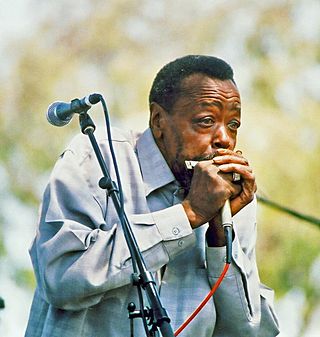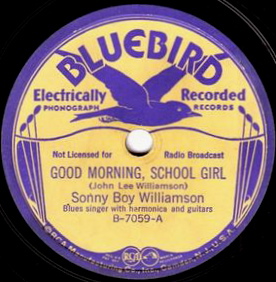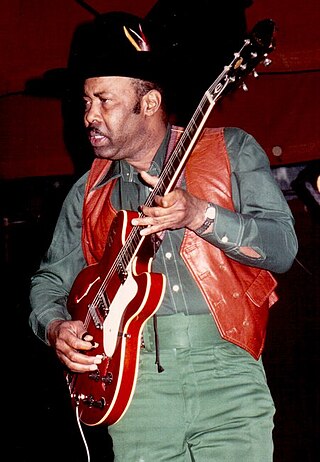
Robert Lockwood Jr. was an American Delta blues guitarist, who recorded for Chess Records and other Chicago labels in the 1950s and 1960s. He was the only guitarist to have learned to play directly from Robert Johnson. Robert Lockwood was one of the first professional black entertainers to appear on radio in the South, on the King Biscuit Time radio show. Lockwood is known for his longtime collaboration with Sonny Boy Williamson II and for his work in the mid-1950s with Little Walter.

Marion Walter Jacobs, known as Little Walter, was an American blues musician, singer, and songwriter, whose revolutionary approach to the harmonica had a strong impact on succeeding generations, earning him comparisons to such seminal artists as Django Reinhardt, Charlie Parker and Jimi Hendrix. His virtuosity and musical innovations fundamentally altered many listeners' expectations of what was possible on blues harmonica. He was inducted into The Rock and Roll Hall of Fame in 2008, the first and, to date, only artist to be inducted specifically as a harmonica player.

Earl Zebedee Hooker was a Chicago blues guitarist known for his slide guitar playing. Considered a "musician's musician", he performed with blues artists such as Sonny Boy Williamson II, Junior Wells, and John Lee Hooker and fronted his own bands. An early player of the electric guitar, Hooker was influenced by the modern urban styles of T-Bone Walker and Robert Nighthawk. He recorded several singles and albums as a bandleader and with other well-known artists. His "Blue Guitar", a slide guitar instrumental single, was popular in the Chicago area and was later overdubbed with vocals by Muddy Waters as "You Shook Me".

James Henry Cotton was an American blues harmonica player, singer and songwriter, who performed and recorded with many fellow blues artists and with his own band. He also played drums early in his career.

Louis Joseph Walker Jr., known as Joe Louis Walker, is an American musician, best known as an electric blues guitarist, singer, songwriter and producer. His knowledge of blues history is revealed by his use of older material and playing styles.

Great Guitars is an album by blues guitarist Joe Louis Walker. It was released in 1997 on the Polygram label as catalogue number 537141.

Clarence "Gatemouth" Brown was an American singer and multi-instrumentalist from Louisiana. He won a Grammy Award for Best Traditional Blues Album in 1983 for his album, Alright Again!

Lonnie Brooks was an American blues singer and guitarist. The musicologist Robert Palmer, writing in Rolling Stone, stated, "His music is witty, soulful and ferociously energetic, brimming with novel harmonic turnarounds, committed vocals and simply astonishing guitar work." Jon Pareles, a music critic for the New York Times, wrote, "He sings in a rowdy baritone, sliding and rasping in songs that celebrate lust, fulfilled and unfulfilled; his guitar solos are pointed and unhurried, with a tone that slices cleanly across the beat. Wearing a cowboy hat, he looks like the embodiment of a good-time bluesman." Howard Reich, a music critic for the Chicago Tribune, wrote, "...the music that thundered from Brooks' instrument and voice...shook the room. His sound was so huge and delivery so ferocious as to make everything alongside him seem a little smaller."

Carey Bell Harrington was an American blues musician who played harmonica in the Chicago blues style. Bell played harmonica and bass guitar for other blues musicians from the late 1950s to the early 1970s before embarking on a solo career. Besides his own albums, he recorded as an accompanist or duo artist with Earl Hooker, Robert Nighthawk, Lowell Fulson, Eddie Taylor, Louisiana Red and Jimmy Dawkins and was a frequent partner with his son, the guitarist Lurrie Bell. Blues Revue called Bell "one of Chicago's finest harpists." The Chicago Tribune said Bell was "a terrific talent in the tradition of Sonny Boy Williamson and Little Walter." In 2023, he was inducted in the Blues Hall of Fame.

Judge Kenneth "Lucky" Peterson was an American musician who played contemporary blues, fusing soul, R&B, gospel and rock and roll. He was a vocalist, guitarist and keyboardist. Music journalist Tony Russell, in his book The Blues - From Robert Johnson to Robert Cray has said, "he may be the only blues musician to have had national television exposure in short pants."

David William Kearney, known as Guitar Shorty, was an American blues guitarist, singer, and songwriter. He was known for his explosive guitar style and wild stage antics. Credited with influencing both Jimi Hendrix and Buddy Guy, Guitar Shorty recorded and toured from the 1950s until the 2020s. In 2017, Billboard magazine said, "his galvanizing guitar work defines modern, top-of-the-line blues-rock. His vocals remain as forceful as ever. Righteous shuffles...blistering, sinuous guitar solos."

"Good Morning, School Girl" is a blues standard that has been identified as an influential part of the blues canon. Pre-war Chicago blues vocalist and harmonica pioneer John Lee "Sonny Boy" Williamson first recorded it in 1937. Subsequently, a variety of artists have recorded versions of the song, usually calling it "Good Morning Little Schoolgirl".

Joe Krown is an American keyboardist, based in New Orleans, Louisiana. Apart from being a solo artist, he is the full time member of Kenny Wayne Shepherd band. He plays New Orleans styled piano and also Hammond B3 organ.
James Earl Thompson, known professionally as Jimmy Johnson, was an American blues guitarist and singer.

Larry McCray, is an American blues guitarist and singer from Magnolia, Arkansas.

Larry Garner is a Louisiana blues musician best known for his 1994 album Too Blues.

Willie Richard, who performed as Hip Linkchain, was an American Chicago blues guitarist, singer and songwriter.

Working Girl Blues is an album by the American musician Phillip Walker, released in 1995. It was his first album for an American label in seven years. Walker supported the album with a North American tour. Working Girl Blues was a hit on blues radio formats.

I'm the Man is the debut album by the American musician Sherman Robertson, released in 1994. It was initially released by Indigo Recordings, in 1993. Robertson supported the album with European and North American tours.


















